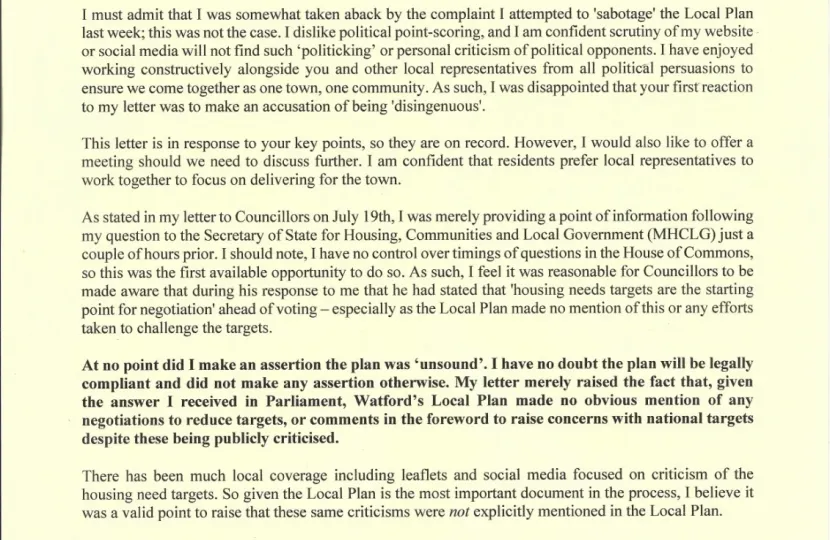
Dean Russell MP, the Member of Parliament for Watford, has offered to meet Watford Mayor following a recent letter making false claims he attempted to 'sabotage' a vote on the Local Plan.
On 19th July, Mr Russell shared a point of information following a question to the Secretary of State for Housing, Communities and Local Government regarding challenging the Housing Needs target for Watford. In the questions, the Secretary of State confirmed 'Housing needs targets are a starting point for negotiation'. The letter was sent to Councillors ahead of a vote on the Local Plan. Full details can be found here: Watford MP Writes To Local Watford Borough Councillors Ahead Of Full Council Vote On Local Plan.
In response to the MP's point of information, the Watford Mayor responded with an unprecedented series of claims including stating the letter was an attempt to 'sabotage' the Local Plan - which Mr Russell strongly refutes.
Mr Russell's full letter can be found below including specific rebuttals on a number of incorrect claims made by the Watford Mayor. In the letter, Dean also makes clear his focus is on working together for the community, and offers to meet the Mayor to ensure local representatives focus on the needs of residents.
The Local Plan can be found here.
The letter consists of three pages. Use the arrows to scroll through. Clicking on the image will enlarge the letter. A full transcript is also provided below.
Dear Mr Taylor,
Thank you for your correspondence dated 21st July relating to my letter to Watford Borough Councillors ahead of the crucial vote on the Local Plan.
I must admit that I was somewhat taken aback by the complaint I attempted to 'sabotage' the Local Plan last week; this was not the case. I dislike political point-scoring, and I am confident scrutiny of my website or social media will not find such ‘politicking’ or personal criticism of political opponents. I have enjoyed working constructively alongside you and other local representatives from all political persuasions to ensure we come together as one town, one community. As such, I was disappointed that your first reaction to my letter was to make an accusation of being 'disingenuous'.
This letter is in response to your key points, so they are on record. However, I would also like to offer a meeting should we need to discuss further. I am confident that residents prefer local representatives to work together to focus on delivering for the town.
As stated in my letter to Councillors on July 19th, I was merely providing a point of information following my question to the Secretary of State for Housing, Communities and Local Government (MHCLG) just a couple of hours prior. I should note, I have no control over timings of questions in the House of Commons, so this was the first available opportunity to do so. As such, I feel it was reasonable for Councillors to be made aware that during his response to me that he had stated that 'housing needs targets are the starting point for negotiation' ahead of voting – especially as the Local Plan made no mention of this or any efforts taken to challenge the targets.
At no point did I make an assertion the plan was ‘unsound’. I have no doubt the plan will be legally compliant and did not make any assertion otherwise. My letter merely raised the fact that, given the answer I received in Parliament, Watford’s Local Plan made no obvious mention of any negotiations to reduce targets, or comments in the foreword to raise concerns with national targets despite these being publicly criticised.
There has been much local coverage including leaflets and social media focused on criticism of the housing need targets. So given the Local Plan is the most important document in the process, I believe it was a valid point to raise that these same criticisms were not explicitly mentioned in the Local Plan.
Even if every other option had been exhausted, and every process followed, choosing not to raise concerns directly in the official documentation read by the National Inspectorate – even informally in the foreword - seemed a notable omission given the considerable efforts to criticise the targets publicly.
I must admit I also question if I would not have been equally criticised if I had not shared the point of information that ‘housing targets are a starting point for negotiation’ until after the vote.
In your letter to me on 21st July there were several further claims about my actions which were incorrect. As such, for the record, I have provided a response to these on the following pages:
Claim: My timing of my letter to Councillors was ‘politicking’.
Response: I received a response to my question in Parliament during the afternoon of the 19th July 2021 which I proceeded to share with Councillors within hours. This would not have been possible sooner, if it had been, I would have done so. Upon reflection, I wonder if the comment is at odds with your own letter sent on June 29th, to the Housing Secretary (Watford Observer, "Watford mayor writes to Government calling for lower housing target") which was highly publicised.
As you noted yourself, the Local Plan was in development for 7 years (and has been out of date since 2018). So, given that written Ministerial responses usually take several weeks, couldn’t the same point be made about the timing of your letter to the Housing Secretary? Your letter was sent just 6 days ahead of approving the Local Plan at your Cabinet meeting on July 5th, then subsequently at Full Council on July 19th.
If a response had been received from the Housing Secretary the day of the vote, would you not have also shared this correspondence? I had hoped the fact I got a direct response from the Housing Secretary on this matter ahead of the vote would be considered constructive not ‘sabotage’ given it was simply a point of information.
Claim:
My concerns on overdevelopment were previously 'unheard' and I have not 'spoken up' to secure lower targets for the town’.
Response:
I have raised concerns directly with Ministers on repeated occasions since being elected in December 2019. The Housing Secretary even referenced this fact in his response on Monday 19th July - which is on the public record.
Publicly, I have also spoken out regarding concerns with overdevelopment and specifically tall towers. Most recently, you can reference my column in the My Local News magazine in May, and in the House of Commons in June 2021 with my statement to the Housing Minister regarding the need for communities to have more say over tall towers, especially given the approval of the 28-storey block in the centre of Watford.
Claim:
I have chosen not to engage with the local plan 'in any meaningful way'.
Response: For the record, apart from a meeting in March 2020, I cannot find any official direct requests from Watford Borough Council to engage in the Local Plan process. Your letter is the first time you have written to me in any official capacity about it.
Quite the contrary, I have had to pro-actively request documents regarding the Local Plan. As you will be aware, the primary public consultations took place before I became the MP. For the most recent consultation earlier this year, the Council did not engage with me in any capacity to ask for my support to promote the consultation, which I understand received responses from approximately 87 residents.
Claim:
I have a 'well-funded office to research issues of concern'.
Response:
I am fortunate to have a fantastic Parliamentary team that consists of just two full-time members and less than a handful of part-time staff. In comparison, the organisation structure at Watford Borough Council employs hundreds of staff, including 21 individuals on salaries over £50,000. Despite the small size of my team, they have worked tirelessly to help me support thousands of constituents with over 12,000 casework files completed throughout the pandemic.
Claim:
'The government has formally criticised Watford for only delivering 48% targets'.
Response:
This is accurate but was a warning to the risks created by not meeting targets. As you are aware, when a Local Authority does not deliver on its housing targets, the National Inspectorate has an increased role in deciding on planning.
The Government reminded WBC that the situation creates more significant risks for development approvals in Watford. Given the existing Local Plan is already several years out-of-date, combined with not meeting targets, there is an existing risk of, as you say, 'developers having a free reign over our land'.
Claim:
'A post on your website you welcome this u-turn [on a new housing needs methodology].'
Response:
This is incorrect. I lobbied for a freeze on housing target numbers compared to increases of 35% in other areas, so I naturally welcomed we did not have an increase in numbers. I did not state I welcomed a ‘u-turn’. In fact, I had many discussions related to the potential changes to the algorithm and had been supportive as long as it would reduce numbers but raised concerns if this would not be the case.
Whilst there was a claim in your letter that it was only ‘backbench MPs from rural areas’ that led to a change in direction, I understand the government was engaging with many different organisations which included the Local Government Association who were also critical of the change. I should note this incorrect claim is also currently being made in political leaflets, with a quote directly from you, so I hope this will be corrected at the earliest possible opportunity.
Claim:
I am 'complicit in imposing unprecedented levels of development'.
Response:
The House of Commons Library publication on ‘Influencing the Planning Process’ states: “Throughout the UK an MP does not have any formal role in the planning process.
Constituents often write to MPs about planning issues, but they should not have unrealistic expectations of what an MP can do. Those taking decisions – planning officers, councillors, planning inspectors and planning ministers – have to follow strict procedural rules. These rules do not allow decisions to be influenced by informal, private discussions with anyone outside the formal process.”.
Given this information, I can only presume the Council’s knowledge that MPs do not have ‘any formal role’ in planning is why no official efforts have been made to engage with me over the past year; for example, I was not copied into your recent letter to the Housing Secretary.
As I am sure we both agree, the Local Plan is the most important official document in the planning process. So, whilst I am surprised you chose not to refer to criticism of targets in the foreword – or elsewhere – in the Local Plan, the point is no longer relevant as the Local Plan has been voted through to the next stage.
I hope my feedback provides clarity on your points. If you would like to meet to discuss further in person, I would be delighted to do so instead of back and forth in writing.
Our community is stronger when we all work together, and I will continue to offer to do so on behalf of all constituents.
Yours sincerely,
Dean Russell MP


